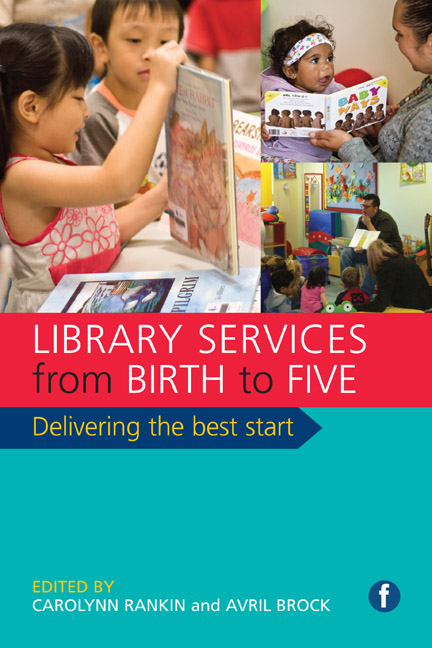Book contents
- Frontmatter
- Contents
- List of figures and tables
- Contributors
- Acknowledgements
- Introduction
- 1 Take them to the library: the pathway of opportunity
- 2 What you need to know about promoting early reading with young children from birth to five
- 3 Attribute value wrong, It should be `City of Literature ... it all starts with ABCD! The City of Melbourne and the Abecedarian Approach
- 4 Transforming practice through research: evaluating the Better Beginnings family literacy programme
- 5 People and partnerships, skills and knowledge
- 6 Resources for early years libraries: books, toys and other delights
- 7 Using digital media in early years library services
- 8 Using play to enhance early years literacy in babies and toddlers: ‘Read, Play and Grow’ at Brooklyn Public Library
- 9 Inclusive early literacy
- 10 Music and rhyme time sessions for the under-fives
- 11 Reaching your audience: the librarian's role
- 12 Successful library activities for the early years and ways to promote books effectively
- 13 Designing family-friendly libraries for the early years
- 14 Planning: organizing projects and money matters in the early years library
- Index
8 - Using play to enhance early years literacy in babies and toddlers: ‘Read, Play and Grow’ at Brooklyn Public Library
Published online by Cambridge University Press: 08 June 2018
- Frontmatter
- Contents
- List of figures and tables
- Contributors
- Acknowledgements
- Introduction
- 1 Take them to the library: the pathway of opportunity
- 2 What you need to know about promoting early reading with young children from birth to five
- 3 Attribute value wrong, It should be `City of Literature ... it all starts with ABCD! The City of Melbourne and the Abecedarian Approach
- 4 Transforming practice through research: evaluating the Better Beginnings family literacy programme
- 5 People and partnerships, skills and knowledge
- 6 Resources for early years libraries: books, toys and other delights
- 7 Using digital media in early years library services
- 8 Using play to enhance early years literacy in babies and toddlers: ‘Read, Play and Grow’ at Brooklyn Public Library
- 9 Inclusive early literacy
- 10 Music and rhyme time sessions for the under-fives
- 11 Reaching your audience: the librarian's role
- 12 Successful library activities for the early years and ways to promote books effectively
- 13 Designing family-friendly libraries for the early years
- 14 Planning: organizing projects and money matters in the early years library
- Index
Summary
Introduction
A librarian covers a table with contact paper, sticky-side up. Little hands reach out and are surprised by the sticky sensation. He asks the children how the table feels and talks to them about the word ‘sticky’. Every autumn, another librarian puts out a bowl of squash and small gourds, and even a medium-sized pumpkin, after her programme. She watches as the babies grab, pat and even roll the vegetables. As they do so, she says, ‘You're patting the pumpkin! Let's all pat the big pumpkin!’ The babies begin to learn that there are words (‘pat’) to describe their actions. In the summer, another librarian gives children cups of water and paint brushes and encourages the children to ‘paint’ the sidewalk in front of the library. She talks to them about what they have created and describes some of the shapes she notices in their work, such as squiggles and spirals, and the children may learn some new vocabulary to describe their world. All of these library activities are prime examples of play driving language development and early literacy. While some of these young children may not yet be talking, they are learning new words and new concepts in a meaningful, contextual way. And all of this happens through play.
Early childhood research has always highlighted the many benefits of play. The expanded and updated toolkit Every Child Ready to Read (American Library Association, 2011) features play as one of the five key early literacy practices (along with reading, talking, singing and writing) that parents should engage in with their children to promote reading readiness. A University of Iowa study reported that 18-month-olds who played with diversely shaped objects learned new words twice as fast as those who played with more similarly shaped objects (Perry et al., 2010). Another study of one- to two-year-olds found that those who played with blocks with their parents for just 20 minutes a day scored 15% higher on language development tests and were 80% less likely to watch television (Christakis, Zimmerman and Garrison, 2007). These studies support what early childhood professionals have observed for decades
- Type
- Chapter
- Information
- Library Services from Birth to FiveDelivering the best start, pp. 169 - 182Publisher: FacetPrint publication year: 2019



